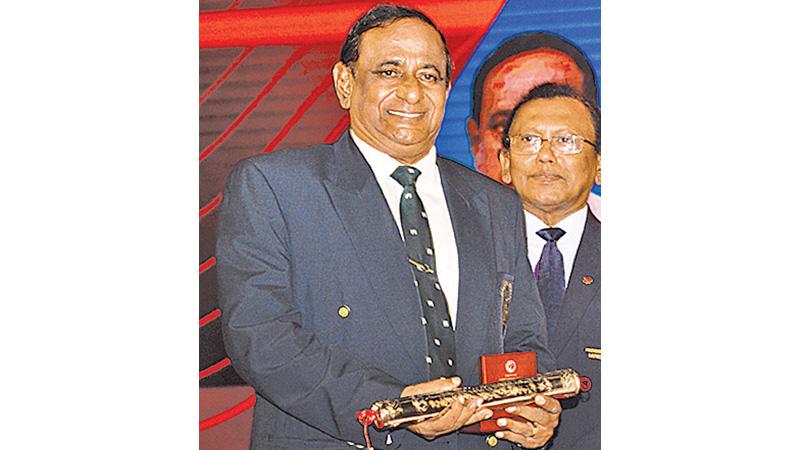
He was high on the hit-list of the now obliterated Liberation Tigers of Tamil Eelam during Sri Lanka’s civil war, but that never stopped Nimal Lewke from pursuing his sporting targets as he lived on the edge and did many things that are yet to be surpassed.
Lewke did not need something or someone to trumpet for him, but last week a packed audience saw him climb on stage to pick up what is the country’s highest honour for sporting achievements called the Kreeda Bushana Award that dwarfs all other laurels or presentations.
“As a sportsman I started from nothing and never earned money from it. It was a God-given thing and this award makes me a very happy person,” said Lewke
A onetime battle-hardened commando, Lewke now finds himself among Sri Lanka’s sporting icons who not only boxed, played and administered rugby, but who became an Invincible braving bombs and bullets for three years on the trot as he coached Kandy Sports Club to pocket three Titles, three times, in three successive years setting up an all-time record.
Only a man with Lewke’s heart and brain could have done what he did, a British, American and Mossad trained war veteran who covered an explosive stretch of Tiger infested countryside in Vavuniya to make the trudge to Kandy and back three days of the week from 1995 to 1997 when the war was at its peak.
He survived countless incursions behind enemy lines on the battle front and is no stranger to followers of sports or even military matters in the country as he carries a load from being a Sri Lanka boxer to rugby player and one of the finest Servicemen in the Special Task Force (STF) until he retired as a Deputy Inspector General of Police who also pioneered VIP protection.
But Lewke was the kind of man who never detached from sports despite being held in high exaltation by the STF’s architect Ravi Jayawardena who handpicked him for specific tasks all of which he executed. His sporting pride was influenced by his military prowess.
It was in rugby that Lewke reached sporting immortality as both player, coach and administrator after he began his career at Kandy Sports Club when its president was Dr. SK Sangakkara, the grandfather of former Sri Lanka cricketer Kumar Sangakkara, who is credited with taking a personal interest in teaching him the basics of the game.
But Lewke soon realized his calling was much bigger and enrolled as a Police Inspector to excel in rugby and shooting that made him one the fastest to draw out a pistol. He captained a formidable Police rugby team in 1980, played in four Clifford Cup finals and on popular demand even refereed a match involving the elite CR and FC team that played against Police after he hung up his boots and took to the whistle.
As a Sri Lanka rugby coach Lewke enjoyed overwhelming success that most of his predecessors failed to attain. Breaking into the coaching scene in 1998, Lewke injected new venom into junior players that elevated him to take charge of the senior team the following year when the job came without money or perks.
Under him Sri Lanka made a clean sweep in matches against China, Taiwan, Thailand, Northern Territory of Australia and Malaysia during a three-year burst while the team also bagged the Asian Rugby Plate and the Neighbour’s Cup. But the pinnacle of Lewke’s career as an administrator came in 2007 when he became president of the Sri Lanka Rugby Football Union (now Sri Lanka Rugby) and the country hosted the Asian Championships where the team ended as runners-up.
He was chiefly responsible for convincing the Asian giants to contest the tournament in Colombo after fears were expressed over security concerns and he went as far as becoming the president of the Asian Rugby Football Union making him only the second Sri Lankan to hold the post.
As a straight-forward no-nonsense man, Lewke also had his share of critics in the sports arena and the media that may have been the result of his pushy ways that he acquired perhaps due to his ambition to prove he was a cut above the rest.
But nobody is likely to grudge the way Lewke would be looking back in time and reflecting on his Lifetime Award that he deservedly bagged at a glittering show. For when most men bow out with more regrets than results, Lewke will have no unfinished business.
When he was once asked by a journalist whether he saw himself as a war hero who wiped out the enemy fighting in the jungles of the eastern province, Lewke replied modestly: “In war there are no winners and losers, only survivors.”
